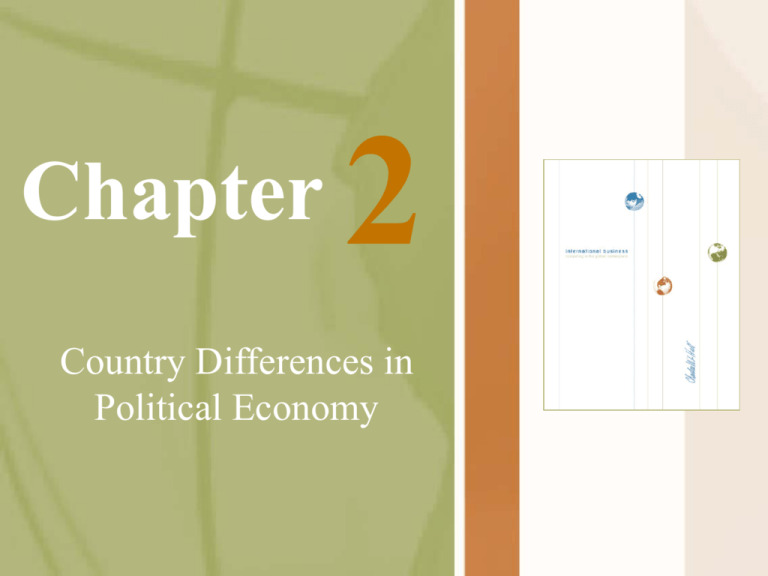
Chapter
2
Country Differences in
Political Economy
2-2
Political Systems
System of Government in Nations”
Political systems have two dimensions
Degree
of collectivism vs. individualism
Degree of democracy vs. totalitarianism
McGraw-Hill/Irwin
International Business, 5/e
© 2005 The McGraw-Hill Companies, Inc., All Rights Reserved.
2-3
Collectivism
Collective goals are more important than
individual goals
Individual rights are sacrificed for the good of
the majority
In the modern world collectivism is expressed
through socialism
McGraw-Hill/Irwin
International Business, 5/e
© 2005 The McGraw-Hill Companies, Inc., All Rights Reserved.
2-4
Socialism
Socialist ideology is split into 2 broad camps
Communism
Communists
believe that socialism can only
be achieved through violent revolution and
totalitarian dictatorship
Social democracy
Marxist roots. State owned enterprises run
for public good rather than private profit
McGraw-Hill/Irwin
International Business, 5/e
© 2005 The McGraw-Hill Companies, Inc., All Rights Reserved.
2-5
Individualism
Is the direct opposite of collectivism
Central tenet is that individual economic
and political freedoms are the ground rules
on which society is based
McGraw-Hill/Irwin
International Business, 5/e
© 2005 The McGraw-Hill Companies, Inc., All Rights Reserved.
2-6
Democracy versus totalitarianism
Democracy and totalitarianism are at
different ends of a continuum with many
shades of gray in between
McGraw-Hill/Irwin
International Business, 5/e
© 2005 The McGraw-Hill Companies, Inc., All Rights Reserved.
2-7
Democracy
Government is by the people, exercised
either directly or through elected
representatives (representative
democracy)
Elected representatives are held
accountable through safeguards
McGraw-Hill/Irwin
International Business, 5/e
© 2005 The McGraw-Hill Companies, Inc., All Rights Reserved.
2-8
Totalitarianism
One person/party exercises absolute
control over all spheres of human life
(competing political parties are banned)
communist totalitarianism
theocratic totalitarianism
tribal totalitarianism
right wing totalitarianism
McGraw-Hill/Irwin
International Business, 5/e
© 2005 The McGraw-Hill Companies, Inc., All Rights Reserved.
2-9
Economic systems
Connection between political ideology
and economic systems
countries where individual goals are given
primacy free market economic systems are
fostered
countries where collective goals are given
primacy there is marked state control of
markets
McGraw-Hill/Irwin
International Business, 5/e
© 2005 The McGraw-Hill Companies, Inc., All Rights Reserved.
2-10
Types of economic systems
Market economy: what is produced & in what
quantity is determined by supply/demand and
signaled to producers through a price system
Command economy: planned by government
Mixed economy: a balance of both of the above
State-directed economy: the state directly
influences the investment activities of private
enterprise through “industrial policy”
McGraw-Hill/Irwin
International Business, 5/e
© 2005 The McGraw-Hill Companies, Inc., All Rights Reserved.
2-11
Spread of market based systems
Centrally
Planned
Economies
Shift
Market –
Based
Economies
Mixed
Economies
McGraw-Hill/Irwin
International Business, 5/e
© 2005 The McGraw-Hill Companies, Inc., All Rights Reserved.
2-12
The nature of economic transformation
Deregulation
Removal
of legal restriction to the free play
of market systems
Allowing establishment and operations of
private enterprises
Privatization
Transfer
of ownership of state owned
enterprise to private individuals
Legal systems
Laws
McGraw-Hill/Irwin
International Business, 5/e
that support a market economy
© 2005 The McGraw-Hill Companies, Inc., All Rights Reserved.
2-13
Implications for international business
Country differences influence:
McGraw-Hill/Irwin
International Business, 5/e
Attractiveness
Benefits
First mover
Late mover advantages
Cost
Risk
Political risk
Economic risk
Legal risk
© 2005 The McGraw-Hill Companies, Inc., All Rights Reserved.





